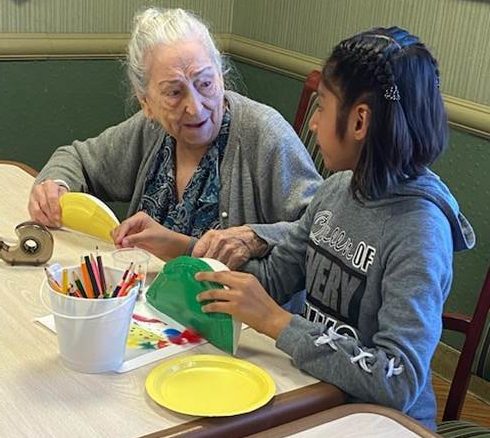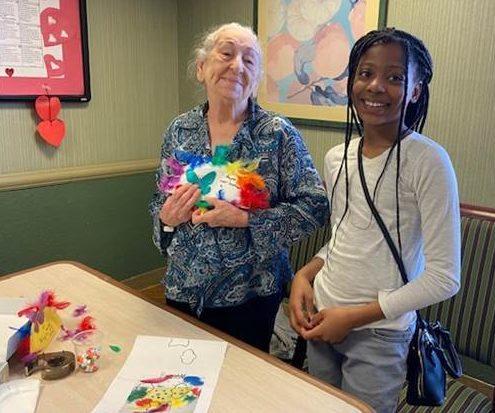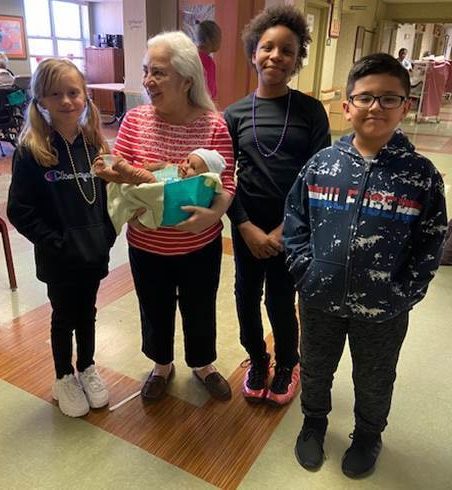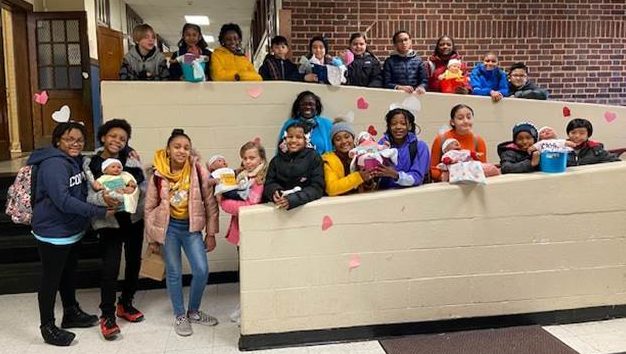
(above) Students from Grover Cleveland visited Alaris Health at Riverton, delivering life-like dolls and spending time with the seniors.
Love and Care: From Our Youths to Our Nursing Homes
Submitted by Dr. Marcia Davis-Dawkins
On Friday, February 21, 2020, Students from Grover Cleveland’s Student Council, Students Taking Action Results in Success (S.T.A.R.S.), visited Alaris Health at Riverton, 1777 Lawrence St., Rahway, NJ. Student Advisors, Dr. Marcia Dawkins and Mrs. Carmen Green are teaching students that they should value all ages in our community, from the very young to the very old.
The oldest in nursing homes and assisted living facilities who suffer from dementia and Alzheimer’s often feel isolated and excluded. Developing stronger connections between older adults and students in the community can have tremendous benefits for both residents of these facilities and students. The student council of Grover Cleveland Elementary School was involved in The Cuddle Care Project, which offered students the opportunity to make a difference in an older person’s life, while instilling respect for elders, sensitivity for others different than themselves or in need, and lessens self-centeredness. This was accomplished by providing patients with therapy dolls that will become an integral part of their lives.
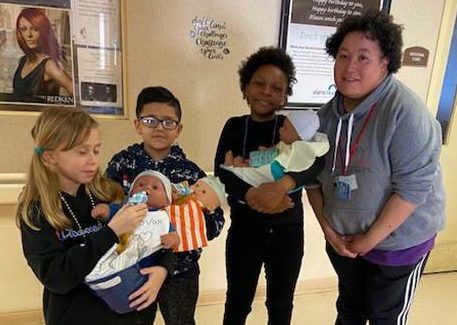
As many as 90% of seniors with dementia or Alzheimer’s struggle with some sort of distress, due to the disease. Caregivers try to ease the burden by giving patients life-like dolls to love and care for. The dolls become an integral part of a senior’s life and caring for the doll as they would care for a baby becomes a major part of their day-to-day responsibilities. Doll therapy, also known as cuddle therapy, may bring back some happy memories of early parenthood and help seniors feel useful and needed. Studies demonstrate that this therapy can be used to increase positive behaviors and decrease negative behaviors in users and is an effective approach in caring for seniors afflicted with dementia. Baby dolls can calm someone who is upset, provide endless hours of hugs and smiles, lull a person to sleep, create a distraction from an upsetting event, provide a tool for interaction, regenerate warm, nurturing feelings and make it possible for someone totally dependent on others to care for someone else.
Students read The Sunsets of Miss Olivia Wiggins by Lester Laminack. This is the touching tale of a woman who resides in a nursing home and who seems to live more in the past than in the present. This book gives voice to the often silent tragedy of watching a loved one slip into the clutches of Alzheimer’s. A discussion was followed focusing on the needs we all have regardless of age: to feel useful, needed and wanted, targeting the relevance of these needs among individuals who are elderly.
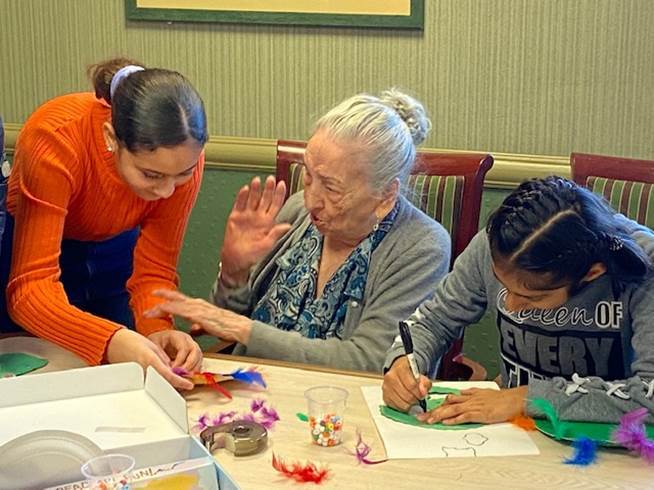
Students were then introduced to the project. They prepared dolls for distribution to elderly. Students dressed dolls, wrapped in receiving blankets and placed in carry all. They also chose an extra outfit as a change of clothing for the elderly to utilize on the doll. There were eight dolls, five of which were provided by the Rahway National Council for Negro Women (NCNW), presented to some residents of the Nursing Home.
This project exposed students to the informational topic of Alzheimer’s, which can be dry and clinical when solely read about. The doll project, visitation, and subsequent discussion brought the subject matter to life. This project also presented an awesome opportunity for intergenerational relationships, and is a great way for students to get a different sense of perspective and context of history through communication with elderly. When students visited Alaris Health at Riverton, they were able to interact with some of the patients and made crafts with them. The smiles on the patients’ faces spoke volumes when they received the dolls to cuddle. Patients were particularly happy since they rarely received visitors.
Students also asked patients, if they could give advice to a younger them what would it be? To which one of the patients responded that he would tell them to be a leader not a follower because they could end up in jail. Another student asked, “What was your fondest childhood memory?” One patient response was that, “She enjoyed visiting her grandmother’s house.”
The students learned how to interact with people other than their peer group and learned responsibility and civic duty. While their work on the doll project remained anonymous to the residents, it instilled in them the value of making a difference in someone’s life and emphasized the importance of volunteering.
When asked what was his favorite part, one student responded that a beautiful woman at the Home was asking him questions about what he was going to do in the future that told him stories about her life. “She had a big smile on her face. She was also very strong.”
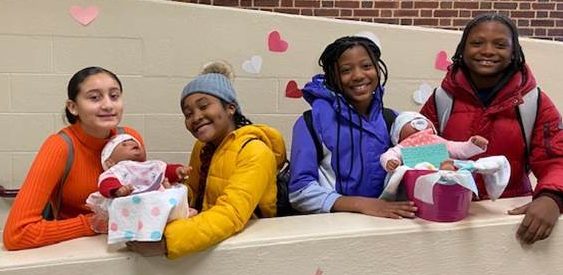
According to one of the Activity Aides, “The residents are very happy because they were engaging – they used their tactile, visual, verbal and a whole lot of love. Patients loved the interaction and the special attention they received.” This was also therapeutic for them. It also showed students that it is good to be compassionate to everyone – both young and old.
To quote President Obama: “We celebrate the selfless individuals around our country who channel their civic virtues through volunteerism… devoted to a cause bigger than themselves… Volunteers help drive our country’s progress, and day in and day out, they make extraordinary sacrifices to expand promise and possibility.”
If you are willing to help or sponsor a doll for the project, please contact Dr. Marcia Davis-Dawkins at mdawkins@rahway.net or 732-910-3125.
Photos by Rahway Public Schools
